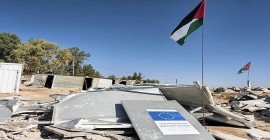State of Palestinian Workers in Israel
Mixed feelings coursed through the Palestinian worker Mohammad when he decided to work in Israel and put his life in danger because of the violence and attacks of settlers against Palestinian workers. On the one hand, he deplores the occupation and is indignant at it, but on the other hand, he has to work or else he will starve.
Hasnaa Al Rantisy – Palestine Economy Portal
Translated by Tamara Barakat
Mohammad explains that, “Whoever travels on buses in the West Bank is subject to humiliation, oppression, and danger, for Israelis will look at them with disdain and try to provoke them, and some might even assault them.”
He continues, “We return to our homes exhausted and with a memory full of the racist and contemptuous looks given to us by Israelis on streets and buses and in stores and the workplace. We are always on the lookout for events in order to be able to anticipate what the next day is going to be like.”
Um Said sits at the front of her house, waiting for the return of her youngest son Ismail, who went to work in the occupied territories at 3:30 in the morning. She says that he does not hold a working permit, and he is a university student, but he did not enroll into university to save his tuition fees and university expenses. He wants to terminate his work today so that he will not let down his employer, and he is very upset with the work condition in Israel and the commute on Israeli buses. She says that he is constantly complaining about the racist looks Israelis give him, and their disregard of the Palestinian worker’s safety.
The mothers, fathers, children, and wives of workers are constantly checking the news channels and social media websites to follow the conditions of their family members working in the occupied territories. Um Ismail says, “Whenever I hear about an operation, I call my son to check up on him, and whenever I hear about an accident where a worker falls or gets injured, I imagine it is my son Ismail.”
She adds, “I will not let him get back to working there. I will ask his uncle to find a job for him at a store or a supermarket until he returns to university.”
Fired under Void Pretexts
Many Palestinian workers were fired from their jobs under weak and void pretexts, such as empathizing with a martyr through a post on social media, not condemning the knifing, or simply for just being Palestinian.
The Palestinian worker stands alone in the face of Israeli harassments of all kinds, as there are not enough job opportunities in the Palestinian labor market for the 100 thousand Palestinian workers who work in Israel, and official parties are unable to protect them from the brutality of the Occupation.
Hussain Fuqaha, an official at the Palestine General Federation of Trade Unions, expressed his refusal of the collective punishment imposed on Palestinian workers in the occupied 1948 Proper, and said that any peaceful protests taking place are a natural response to the racism and policies of the Occupation. Israel’s threat to fire workers is part of a systematic policy to impoverish the Palestinian people, pressure them, and blackmail them in order to achieve political gains.
Moreover, Fuqaha said that according to international law, Israel is responsible for finding job opportunities for the Palestinian workers, and so, it cannot fire them. Rather, it must protect them from the extremists.
A Legal Memorandum on the Agenda
Additionally, Fuqaha said that the Union is considering drafting a legal memorandum with the help of legal experts, and addressing it to international organizations to request the protection of Palestinian workers who work in the occupied 1948 Proper.
Regarding the rights of workers who do not hold any working permits allowing them to enter the occupied 1948 Proper, Fuqaha said that the Union is working on a study to prove the illegality of discriminating against workers based on whether or not they carry a permit. About 50 thousand Palestinian workers do not have Israeli working permits, and consequently do not enjoy any rights, social security, or vacations.
Possible Solutions
Fuqaha believes that the Palestinian side should work in two directions in parallel. First, it should place its efforts on ending the occupation in order to achieve a general plan of sustainable development. Its emergency moves should involve working on creating job opportunities for Palestinian workers on Palestinian lands, by setting future policies and engaging in talks with the relevant parties such workers, the Government, employers, and unions in order to set the needed plans.
Regarding the rights of workers who are subject to harassment and violations during the performance of their job, Fuqaha said that the Union has a legal department responsible for following up with these workers, in cooperation with legal experts within Palestine and the occupied territories. The Union is cooperating with the Maki, as a union body, to follow up on the conditions of the workers. He also added that a joint committee was established to work on preserving the rights of Palestinian workers in the occupied 1948 Proper, and it succeeded in collecting millions for the workers.






